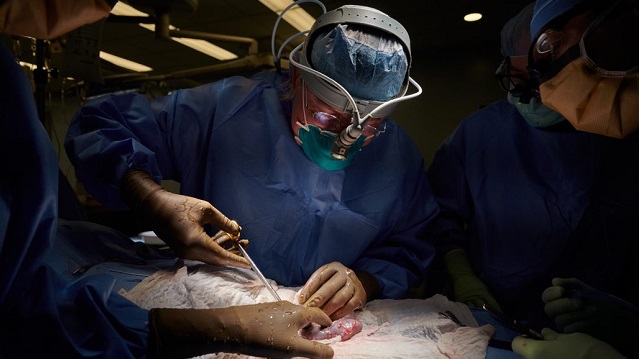
Dr. Robert Montgomery, the H. Leon Pachter, MD, Professor and chair of the Department of Surgery at NYU Langone and director of its Transplant Institute, performs the first xenotransplantation of a genetically engineered nonhuman kidney to a human at NYU Langone Health. Credit Joe Carrotta for NYU Langone Health
History was made by doctors at New York University’s Langone Transplant Institute in Manhattan when they successfully transplanted a kidney from a pig into a human being. Yes! You heard that right! A person now has a kidney that was donated from a pig.
Anyone who ever watches the doctors shows on TV knows how hard it it to get a transplant. And with the organs of the Kidneys and liver it is especially hard because blood type is not the only thing that needs to match. Many different aspects of those organs must match the physiology of the recipient.
And the biggest problem is that the organs can only be harvested from people who died within a day or so of the transplant, did not suffer from any disease and were killed in an accident of some sort that did not damage their organs, and were signed as organ donors.
With kidneys, since a person has two, it is sometimes possible to find a living donor. But then he must be willing to part with one.
Now, obviously the idea of accepting anything from a pig into your body, especially a vital organ, is repugnant to most people. And not just to Jews and Muslims. But at one time they used insulin from pigs to treat diabetics. So this is not such a new idea.
But how can they give a person an animal organ when the physiological differences are so great? Well, first of all the pig was genetically engineered for this. And the test patient was actually already brain dead and kept alive on a ventilator for testing purposes only.
Known as xenotransplantation, the surgery was performed on Saturday, September 25, 2021, at NYU Langone’s Kimmel Pavilion. Robert Montgomery, MD, DPhil, the H. Leon Pachter, MD, Professor of Surgery and chair of the Department of Surgery at NYU Langone and director of the NYU Langone Transplant Institute, led a surgical team during the two-hour operation.
The kidney was obtained from a genetically engineered pig hundreds of miles away and transplanted into a deceased donor. The donor was maintained on a ventilator, with the consent of the family, for 54 hours while doctors studied the kidney’s function and watched for signs of rejection.
The FDA explains that Xenotransplantation is any procedure that involves the transplantation, implantation or infusion into a human recipient of either (a) live cells, tissues, or organs from a nonhuman animal source, or (b) human body fluids, cells, tissues or organs that have had ex vivo contact with live nonhuman animal cells, tissues or organs. The development of xenotransplantation is, in part, driven by the fact that the demand for human organs for clinical transplantation far exceeds the supply
“This is a transformative moment in organ transplantation,” Dr. Montgomery says. “The medical and scientific communities have been working toward xenotransplantation to sustain human life for more than 50 years. There have been many hurdles along the way, but our most recent procedure significantly moves these endeavors forward. This research provides new hope for an unlimited supply of organs, a potential game-changer for the field of transplantation and those now dying for want of an organ.”
The surgery was part of a larger study approved by a specially designated research ethics oversight board at NYU Langone. It is the latest step in a research protocol that calls for additional and similar procedures to be performed. Whole body donation after death for the purpose of breakthrough studies represents a new pathway that allows an individual’s altruism to be realized after brain death declaration in circumstances in which their organs or tissues are not suitable for transplant.
There are developing organs for transplant using 3D tech and grown from the cells of the person who will receive the organ. They are finding ways to clone a person’s organ and grow a new one in time for transplant. Even if the person suffers from a congenital disease they will have plenty of time before the illness manifests.
These techniques do away with the problems of a recipient’s immune system rejecting the transplant. The human body senses the alien DNA in the donated organ and so it requires extensive treatments to ensure that the transplant succeeds.
Now they may be able to adequately alter an animals organs for use in transplants. But with the rate at which new tech is developing, it may soon be unnecessary to do so.



